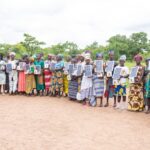Hannah Kudjoe, born Hannah Dadson in December 1918, was a renowned advocate for Ghanaian independence during the 1940s and 1950s. She was a trailblazing female nationalist in the movement, serving as the National Propaganda Secretary for the Convention People’s Party and becoming one of its high-profile members.
Hannah played an instrumental role in the political activism of Dr. Kwame Nkrumah’s government. Additionally, she worked as a dedicated philanthropist, striving to improve the lives of women in Northern Ghana. Her charismatic personality enabled her to unite and mobilize people toward the cause of independence.
Hannah was instrumental in supporting Kwame Nkrumah by rallying people to join and support the CPP. Notably, she played a crucial role in securing the release of the Big Six when they were arrested, bringing people together to call for their freedom from their colonial masters. Hannah’s legacy continues to inspire generations of Ghanaians, especially women, to advocate for their rights and take an active role in the political landscape of Ghana.
Early Life
Hannah Esi Badu Kudjoe, nee Hannah Dadson, was the youngest of 10 children born in Busua, a town in the Ahanta District of the Western Region of the Gold Coast (now Ghana) in December 1918 to Mr. and Mrs. John Peter Dadson. She was fortunate to have received an education during a time when it was uncommon for girls to attend school.
Her elementary education began at Busua Methodist School and was completed at Sekondi Methodist School. After completing her education, she became a renowned dressmaker in Tarkwa, where she married J. C. Kudjoe, the manager of Abontiako gold mines near Tarkwa. However, the marriage did not last, and she began living with her brother, E. K. Dadson, who was a prominent activist for the United Gold Coast Convention (UGCC).
Political Career
In June 1947, a young woman named Grace Kudjoe met Kwame Nkrumah, who was the General-Secretary of the United Gold Coast Convention (UGCC), a political party formed to fight against British colonialists and grant Ghana its independence. Nkrumah explained to Kudjoe the importance of women in politics and convinced her to attend UGCC meetings.
After this encounter, Kudjoe became a key supporter of the UGCC, raising support for the party and leading a campaign for the release of the Big Six when they were arrested. She was a founding member of the Committee of Youth Organization within the UGCC and was one of the seven signatories who endorsed a document in April 1949 that threatened a full split away from the UGCC if Kwame Nkrumah wasn’t reinstated as the party’s general secretary.
However, Kwame Nkrumah was not reinstated, which led to the formation of the Convention People’s Party (CPP). Kudjoe moved along with Nkrumah after the split and became an active participant of the Positive Action campaign of mass civil disobedience coupled with political protests that eventually led to the end of colonial rule, Nkrumah’s election victory, and the formation of an independent nation.
She inspired massive support for the CPP through this campaign and rose to become the organizer and the National Propaganda Secretary of the CPP. In that role, she toured the country advocating for the need for independence and organizing rallies propagating the Nkrumah movement and the CPP. She was an extremely effective organizer, mobilizing many people, including women, to join the CPP.
After the CPP won the 1951 elections, Kudjoe focused more on her role in the party by growing the party’s base and building support. After Ghana gained its independence from the British, Kudjoe founded the All-Africa Women’s League in 1957, which later became the Ghana Women’s League. Whilst working in her official roles with the CPP in the 1950s and 1960s, Kudjoe was also undertaking social welfare works within the Northern regions of Ghana teaching both young women and adults basic life skills in hygiene, home keeping, dressing, and how to raise children.
She, later on, became the national organizer for the Ministry of Labor and Social Protection whilst still undertaking her social welfare works in the north. In 1964, her social welfare program in the north was placed under the management of the National Committee of Social Advancement under the Ministry of Labor and social protection.
Kudjoe championed an anti-nudity campaign in Northern Ghana and taught women hygiene practices such as how to boil water to bathe children. She undertook this work largely independently of the new government, leading to disapproval from the government, who minimized her role. She also helped distribute food in times of famine and encouraged women to farm to grow their own food.
After Kwame Nkrumah was overthrown by the military on 24 February 1966, Kudjoe left the political scene like every CPP member and returned to her private life. She continued with her philanthropic works in the north through the 1970s and 1980s till she died in 1986.
Her Death
On March 9th, 1986, Hannah Kudjoe passed away, as reported in her obituary published on May 8th, 1986. The obituary lauded her as a priceless gem who played a significant role in Ghana’s political emancipation from imperialism. Her death left a spiritual void that would be challenging to fill, as stated in the same obituary. Her funeral was held on July 6th, 1986, at the Calvary Methodist Church in Accra.






































